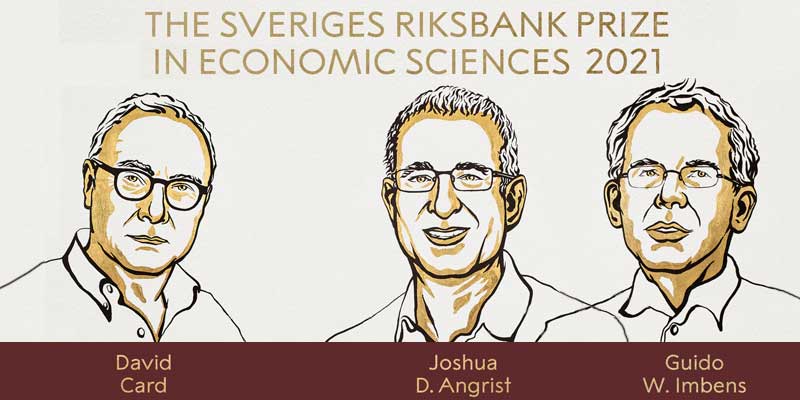- World
- Oct 11
David Card, Joshua Angrist & Guido Imbens win Nobel for Economics
• Three economists won the 2021 Nobel Prize for Economics.
• David Card of the University of California at Berkeley was awarded one half of the prize “for his empirical contributions to labour economics”.
• The other half was shared by Joshua Angrist from the Massachusetts Institute of Technology and Guido Imbens from Stanford University “for their methodological contributions to the analysis of causal relationships”.
• The Royal Swedish Academy of Sciences said the three have completely reshaped empirical work in the economic sciences.
• The Prize, formally known as the Sveriges Riksbank Prize in Economic Sciences in Memory of Alfred Nobel, is the last of this year’s crop of Nobel Prizes.
• Unlike the other Nobel Prizes, the economics award wasn’t established in the will of Alfred Nobel but by the Swedish central bank in his memory in 1968, with the first winner selected a year later.
The concept of natural experiments
The three economists have provided us with new insights about the labour market and shown what conclusions about cause and effect can be drawn from natural experiments. Their approach has spread to other fields and revolutionised empirical research.
Many of the big questions in the social sciences deal with cause and effect. How does immigration affect pay and employment levels? How does a longer education affect someone’s future income? These questions are difficult to answer because we have nothing to use as a comparison. We do not know what would have happened if there had been less immigration or if that person had not continued studying.
This year’s laureates have shown that it is possible to answer these and similar questions using natural experiments – situations arising in real life that resemble randomised experiments. The key is to use situations in which chance events or policy changes result in groups of people being treated differently, in a way that resembles clinical trials in medicine.
Using natural experiments, David Card has analysed the labour market effects of minimum wages, immigration and education. His studies from the early 1990s challenged conventional wisdom, leading to new analyses and additional insights. The results showed, among other things, that increasing the minimum wage does not necessarily lead to fewer jobs. We now know that the incomes of people who were born in a country can benefit from new immigration, while people who immigrated at an earlier time risk being negatively affected. We have also realised that resources in schools are far more important for students’ future labour market success than was previously thought.
Natural experiments differ from clinical trials in one important way. In a clinical trial, the researcher has complete control over who is offered a treatment and eventually receives it (the treatment group) and who is not offered the treatment and therefore does not receive it (the control group). In a natural experiment, the researcher also has access to data from treatment and control groups but, unlike a clinical trial, the individuals may themselves have chosen whether they want to participate in the intervention being offered. This makes it much more difficult to interpret the results of a natural experiment.
In an innovative study from 1994, Joshua Angrist and Guido Imbens showed what conclusions about causation can be drawn from natural experiments in which people cannot be forced to participate in the programme being studied (nor forbidden from doing so). The framework they created has radically changed how researchers approach empirical questions using data from natural experiments or randomised field experiments.
Manorama Yearbook app is now available on Google Play Store and iOS App Store

